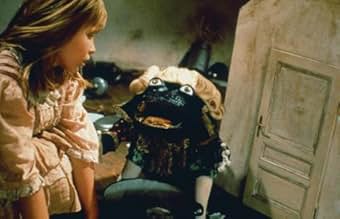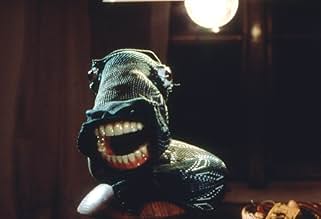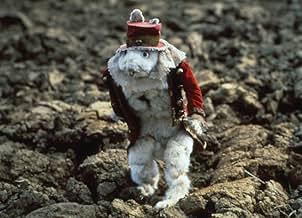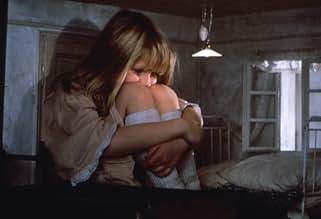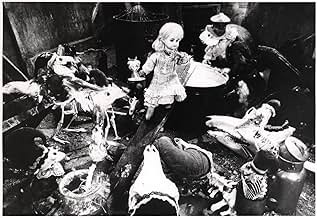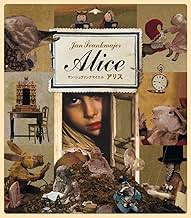A surrealistic revision of Alice in Wonderland.A surrealistic revision of Alice in Wonderland.A surrealistic revision of Alice in Wonderland.
- Director
- Writers
- Stars
- Awards
- 1 win & 1 nomination total
Camilla Power
- Alice
- (English version)
- (voice)
- Director
- Writers
- All cast & crew
- Production, box office & more at IMDbPro
Featured reviews
Animation legend Jan Svankmajer applies his distinctive style to Lewis Carroll's most famous creation, crafting one of the most original and unforgettable takes on Alice's adventures ever put to film. Having previously adapted Carroll in his 1971 short film, "Jabberwocky," Svankmajer returns to the author's work with this amazing feature-length film. Employing a magnificent blend of live action and stop-motion animation, he uses many of Carroll's ideas as jumping-off points. Many of the characters are reconstructed as nightmarish abstracts of the way they have usually been depicted in previous adaptions. The white rabbit is a stuffed real rabbit who keeps his watch tucked in a sawdust-leaking gap in his chest. The Dormouse has been reduced to a creepy crawling foxlike hide, and the Caterpillar is a sock with eyeballs and teeth that sews its eyes shut when it sleeps. Although familiar characters such as the Mock Turtle and the Cheshire Cat are left out, Svankmajer's film is incredibly faithful to the book's sense of fantasy and absurdity. The minimal dialogue and pronounced sound effects also add to the overall unsettling mood. The key to truly appreciating this version is to forget the common associated imagery from other adaptions, and treat this as its own entity. Just as a dream makes a totally different impression on you than a person you describe it to (regardless of how well you describe it), this film is one man's surreal interpretation of another man's surreal description. The skull-headed birds, walking dolls, and broken-down furniture of Svankmajer's world make this a pretty disturbing telling of Alice's journey, but a masterful, enthralling, and undeniably unique one as well.
Wow, an 'Eraserhead' for children. This film has some of the most gorgeous imagery in an animated film that I've seen. I don't remember too much of "Alice in the Wonderland" from the Disney version that I've seen a couple years ago, but I've got a hunch it didn't involve a girl crawling through a drawer after a rabbit with clicking gopher teeth and a limited diet of sawdust that he has a problem containing in his body, only for her to be left in a room that she fills with her own tears while a small rat has a cookout on her head. "Alice" is a re-telling of the popular children's tale, but it's a vivid and imaginative version that has the ability to disturb to the very same effect of the David Lynch film. The stop-motion animation enhances the creepiness of the film where familiar characters are given a Gothic and dark makeover. The story takes place in an old fashioned setting; the walls faded with age and abandonment. I loved the setting of this odd little tale and its very morbid idea of a "wonderland" and its characters including a frog with a very realistic tongue, a "catapiller" that we wouldn't normally think of such, and a moving wad of meat. The resulting film is a stunning achievement. My only somewhat minor qualm, the narration of the main character Alice's lips popping up repetitively throughout the film really started to get grating in the first couple of minutes. However, completely random and unpredictable, "Alice" moves at a somewhat slow pace but develops a level of coherency in the midst of all its strange happenings. The sounds, all though a bit loud, give so much life to the smallest objects. The film effectively evokes the emotions of the human psych that a surrealist film should aim for. And, in the context of a celebrated children's story, it elevates its effect with jarring imagery and sound that make it memorable and an important film in the history of animated film.
This movie may be labeled frustratingly plotless by some, and that's fair, but the imagery in this strange combination of stop-motion animation and live footage is so hauntingly rich and evocative that you get the feeling that someone has secretly filmed your own childhood dreams and translated them into Czech - perhaps for the viewing pleasure of the former commissars. The basic idea is that all of ALICE IN WONDERLAND is occurring in Alice's house, and a staggering variety of household items are animated into jerky sort of life, while all the character voices - Mad Hatter, Queen of Hearts, White Rabbit - are spoken by Alice. Alice's house, however, is a Czech house, and the items are old even by Soviet bloc standards. It's as if an antique rummage sale suddenly sprang to life to act out a monstrous little comedy for one girl. And the architecture is simultaneously comforting and frightening. Windows, for example, merely open onto other rooms, all lit by bare light bulbs. What keeps the thing tied to Lewis Carroll is the performance of the little girl playing Alice. She appears to be about six or seven, and despite the disturbing events going on around her, she never appears frightened, and always investigates events as they grow curiouser and curiouser with a determined pluck. This little girl is always in control. What this adaptation lacks in forward momentum or narrative drive it makes up for with a surreal poetry of the domestic space as dreamed by a child.
This film mixes the live action of just one actress - Alice - with a ghoulish array of stop-motion animated characters and objects. Whereas Lewis Carroll's original "Alice in Wonderland" story is a celebration of childhood innocence, fantasy, and magical belief, Svankmajer's "Alice" tells the reverse - the loss of childhood innocence through the pain of coming to terms with a less-than magical world. Inspired by the original tale, Svankmajer uses Carroll's idea of a childishly implausible and wild dream to symbolise an escape from a tormented childhood, rather than a daydreaming fantasy in the sun.
With very little dialogue at all, Alice's job as an actress is restricted entirely to responding appropriately to the puppets - which involves no more than recoiling or widening her eyes. This takes nothing away from the film, however; Alice's muteness is a reflection of the classic "children should be seen and not heard" oppressive school of parenting. Indeed, Alice is seen throughout the film to, despite the hellish surroundings, still wipe her feet on doormats, remove her shoes before entering rooms, and do as she is told. She has been brought up through a harsh discipline that keeps her mute, polite, under control and unquestioning - indeed the very first scene of the film shows her older sister wordlessly slap her for being curious as to the contents of a book. This oppressive discipline is part of what makes up Alice's dismal reality, and hence is part of what she is both trying to escape and rebel from by dreaming.
The sad result is that even Alice's dreams are tormented. Children can only dream about the things presented to them in reality. In the first scenes of the film, the camera pans across Alice's room and displays all the junk carelessly surrounding her - a keen viewer will notice that these are the very same objects that Svankmajer later animates inside Alice's dream. It is precisely because Alice's real world is so abysmal that her dream reflects it. Her house seems devoid of life - we never see any parents, and the sister is still out by the riverside - and the house itself is claustrophobic, dark and utterly unfit for human habitation. The ornaments are stuffed bugs, the only visible food is being pickled in tightly clasped jars, and every single surface is smothered in brown grime. The lack of any other life in the house and the lack of any form of homely care, all depict a tragedy of childhood neglect - Svankmajer blames the nightmare entirely on the parents.
Within her dream, Alice suddenly finds that her room expands outwards into an endless muddy plain. This expanse, a dream of freedom, is tragically desolate and uninviting. Nevertheless, she follows one of her now-animated "toys" (the white rabbit) out into the field. Over the course of the film she will meet with a sailing rat, a truly insane depiction of the Mad Hatter and March Hare, and the murderous Queen of Hearts. But ultimately these are only the dream-animated versions of toys Alice detests. The truly sinister characters in her dream are those that come directly from her house, her life. The pickled jars of food turn out to be mixed with drawing pins, the "Drink Me" and "Eat Me" potions and cakes are bottles of ink and nondescript tarts, a mousetrap spells the demise of the sailing rat; when left on her own in a room, its contents attack her - slabs of meat slither around, bread turns to a porcupine of nails, food cans turn out to contain the stuffed beetles used as ornaments in her house (now living).
It is in this scene that Alice first starts to experience some symbolic victory. Throughout the film we see Alice begin to show more curiosity, begin to learn, begin to rebel against what she is told to do, and begin - most importantly - to come to terms with her surroundings. She is ultimately locked away in a dark room - the culmination of all the negative forces around her - trapped inside a doll of herself. Nothing could be more symbolic of the repressive upbringing that has spawned this twisted dream. She has realised that she's been made into a doll - inhuman. It is with this realisation that Alice achieves her first rebellion, tearing her way out of the doll and - through unhindered curiosity - discovers the key to leave the room by.
We are constantly reminded that the dream is a learning process for Alice. Every single time there is dialogue within the film, we immediately see Alice's lips say the words "...the March Hare said", or "...Alice thought to herself". These metatextual scenes suggest Alice is fully aware that this is all a story of her own imaginings. At bare minimum, it suggests that Alice has a level of awareness that oversees the story as a whole - she is looking upon these events with some purpose.
Alice wakes from her dream a changed person. She has grown up the hard way - her last vain attempt at a childish fantasy built from her sordid life has led her to come to terms with how reality really is. She has learnt that we cannot be mute and polite little girls - the world will attack us, and we must defend ourselves. It's a sorry world-view she ends up with, but one necessary for her to be able to live in the neglected environment she's been brought up in. Thus the film ends with her own decision and dialogue - "the rabbit is late again" - she snaps a pair of scissors - "perhaps I'll cut his head off".
Svankmajer's "Alice" is a masterpiece of stop-motion animation. Puppets come terrifyingly to life, and the surreal dream Alice undergoes is an intensely striking barrage of disturbing images. It is no film for children.
With very little dialogue at all, Alice's job as an actress is restricted entirely to responding appropriately to the puppets - which involves no more than recoiling or widening her eyes. This takes nothing away from the film, however; Alice's muteness is a reflection of the classic "children should be seen and not heard" oppressive school of parenting. Indeed, Alice is seen throughout the film to, despite the hellish surroundings, still wipe her feet on doormats, remove her shoes before entering rooms, and do as she is told. She has been brought up through a harsh discipline that keeps her mute, polite, under control and unquestioning - indeed the very first scene of the film shows her older sister wordlessly slap her for being curious as to the contents of a book. This oppressive discipline is part of what makes up Alice's dismal reality, and hence is part of what she is both trying to escape and rebel from by dreaming.
The sad result is that even Alice's dreams are tormented. Children can only dream about the things presented to them in reality. In the first scenes of the film, the camera pans across Alice's room and displays all the junk carelessly surrounding her - a keen viewer will notice that these are the very same objects that Svankmajer later animates inside Alice's dream. It is precisely because Alice's real world is so abysmal that her dream reflects it. Her house seems devoid of life - we never see any parents, and the sister is still out by the riverside - and the house itself is claustrophobic, dark and utterly unfit for human habitation. The ornaments are stuffed bugs, the only visible food is being pickled in tightly clasped jars, and every single surface is smothered in brown grime. The lack of any other life in the house and the lack of any form of homely care, all depict a tragedy of childhood neglect - Svankmajer blames the nightmare entirely on the parents.
Within her dream, Alice suddenly finds that her room expands outwards into an endless muddy plain. This expanse, a dream of freedom, is tragically desolate and uninviting. Nevertheless, she follows one of her now-animated "toys" (the white rabbit) out into the field. Over the course of the film she will meet with a sailing rat, a truly insane depiction of the Mad Hatter and March Hare, and the murderous Queen of Hearts. But ultimately these are only the dream-animated versions of toys Alice detests. The truly sinister characters in her dream are those that come directly from her house, her life. The pickled jars of food turn out to be mixed with drawing pins, the "Drink Me" and "Eat Me" potions and cakes are bottles of ink and nondescript tarts, a mousetrap spells the demise of the sailing rat; when left on her own in a room, its contents attack her - slabs of meat slither around, bread turns to a porcupine of nails, food cans turn out to contain the stuffed beetles used as ornaments in her house (now living).
It is in this scene that Alice first starts to experience some symbolic victory. Throughout the film we see Alice begin to show more curiosity, begin to learn, begin to rebel against what she is told to do, and begin - most importantly - to come to terms with her surroundings. She is ultimately locked away in a dark room - the culmination of all the negative forces around her - trapped inside a doll of herself. Nothing could be more symbolic of the repressive upbringing that has spawned this twisted dream. She has realised that she's been made into a doll - inhuman. It is with this realisation that Alice achieves her first rebellion, tearing her way out of the doll and - through unhindered curiosity - discovers the key to leave the room by.
We are constantly reminded that the dream is a learning process for Alice. Every single time there is dialogue within the film, we immediately see Alice's lips say the words "...the March Hare said", or "...Alice thought to herself". These metatextual scenes suggest Alice is fully aware that this is all a story of her own imaginings. At bare minimum, it suggests that Alice has a level of awareness that oversees the story as a whole - she is looking upon these events with some purpose.
Alice wakes from her dream a changed person. She has grown up the hard way - her last vain attempt at a childish fantasy built from her sordid life has led her to come to terms with how reality really is. She has learnt that we cannot be mute and polite little girls - the world will attack us, and we must defend ourselves. It's a sorry world-view she ends up with, but one necessary for her to be able to live in the neglected environment she's been brought up in. Thus the film ends with her own decision and dialogue - "the rabbit is late again" - she snaps a pair of scissors - "perhaps I'll cut his head off".
Svankmajer's "Alice" is a masterpiece of stop-motion animation. Puppets come terrifyingly to life, and the surreal dream Alice undergoes is an intensely striking barrage of disturbing images. It is no film for children.
Watched this last night - one of my favorites, especially as and ex-art student. He animated everything from socks to lumps of meat. Very dark, and would have been darker yet without the little girls voice over. My favorite scene, I think, is when the water rat sets up camp on her head. There is a lot to watch out for in this film, a hundred little touches, and references. Follows the book to a certain extent, but goes its own lunatic-asylum way. If you have very vivid dreams and wake up in the morning wondering 'what the heck was that all about?', it is a bit like watching this film:)
Did you know
- TriviaDirector Jan Svankmajer had been disappointed by other adaptations of Carroll's book, which interpret it as a fairy tale. His aim was instead to make the story play out like an amoral dream.
- GoofsAfter testing the wooden mushroom fragments, Alice puts the piece that shrinks things in her right pocket and the other that enlarges things in the left one. In the next scene she encounters a tiny house and takes out the right hand fragment to enlarge it.
- ConnectionsFeatured in Brows Held High: Alice (2011)
- How long is Alice?Powered by Alexa
Details
- Runtime
- 1h 26m(86 min)
- Sound mix
- Aspect ratio
- 1.37 : 1
Contribute to this page
Suggest an edit or add missing content

